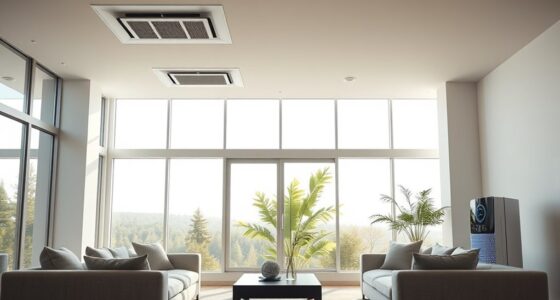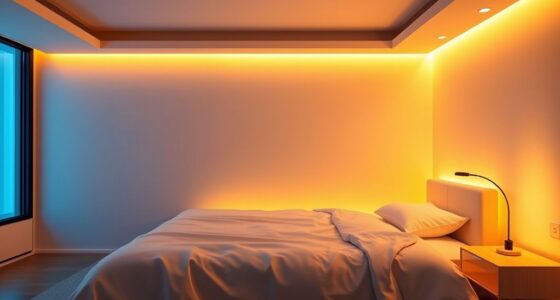Even at just 40 decibels, indoor noise can quietly disrupt your focus and increase stress without you noticing. Background sounds like appliances or conversations create subtle distractions that interfere with your mental clarity and productivity. These low-level noises can accumulate over time, making it harder to concentrate and maintain well-being. To discover effective solutions for creating a calmer, more focused environment, keep exploring ways to manage indoor sound levels and reduce disruptions.
Key Takeaways
- Indoor noise levels as low as 40 dB can subtly impair concentration and mental clarity.
- Background sounds from appliances or conversations at 40 dB increase stress and reduce focus over time.
- Disruptive ambient noise at this level interferes with cognitive tasks and decreases productivity.
- Without sound masking or acoustic treatment, 40 dB noise can make it harder to maintain peace and focus.
- Managing indoor noise through soundproofing and masking enhances mental well-being and concentration.

Indoor noise pollution is a growing concern that often goes unnoticed, yet it can substantially impact your health and well-being. Even seemingly quiet environments are susceptible to disruptive sounds that can diminish your focus, increase stress, and interfere with your daily activities. When background noise reaches as low as 40 decibels, it might seem unobtrusive, but it can still subtly sabotage your concentration. This type of noise, often coming from nearby appliances, conversations, or external traffic, can create a constant distraction that hampers your productivity and mental clarity.
Indoor noise at just 40 dB can subtly disrupt focus and increase stress.
One effective way to combat this issue is through sound masking, which involves introducing a consistent, unobtrusive background sound that blends with ambient noise to make distractions less noticeable. Sound masking systems are designed to cover up disruptive noises by filling your environment with a gentle, soothing sound that doesn’t draw attention to itself. By doing so, they help you focus better, whether you’re working, studying, or relaxing at home. Acoustic treatments also play a vital role in reducing unwanted noise. These include installing sound-absorbing panels, curtains, or specialized wall treatments that dampen sound waves and prevent noise from bouncing around your space.
Implementing acoustic treatment is a strategic move, especially if your home or office is prone to noise pollution. It’s not just about blocking sound; it’s about creating a balanced acoustic environment where the sounds that do exist are controlled and minimized. Combining acoustic treatment with sound masking creates a layered approach that markedly improves your indoor soundscape. For example, adding acoustic panels in your workspace can absorb echoes and reduce the overall noise level, making the environment calmer and more conducive to concentration. Meanwhile, sound masking can fill the gaps with a steady, neutral sound, effectively making background noise less disruptive.
You might not realize it, but these solutions can make a noticeable difference in your daily life. Instead of constantly battling background noise that seems minor but is actually draining your focus, you’ll find that a well-treated space with sound masking creates a more peaceful environment. It’s about taking control of your acoustic environment so that noise pollution, even at levels around 40 dB, doesn’t sabotage your ability to concentrate or relax. An understanding of sound masking and acoustic treatment options can help you create a more effective noise reduction strategy tailored to your needs. By investing in sound masking and acoustic treatment, you’re making a proactive choice to protect your mental clarity and overall well-being from the subtle but persistent effects of indoor noise pollution.
Frequently Asked Questions
Can Noise Levels Below 40 Db Still Affect Concentration?
You might wonder if noise levels below 40 dB can still impact your concentration. Even in silent environments, noise sensitivity varies; some individuals are more affected by faint sounds. You could find that subtle noises, like distant conversations or household hums, distract you and hinder focus. Your noise sensitivity means that even low-level sounds can disrupt your concentration, so creating a truly quiet space might be essential for your productivity.
What Are the Health Risks of Prolonged Exposure to 40 Db Noise?
Prolonged exposure to 40 dB noise can subtly impact your health. It may cause sleep disturbances, making you feel tired and less alert during the day. Over time, this can affect your mental health, increasing stress and anxiety levels. Even moderate noise like 40 dB can disrupt your rest and emotional well-being, so it’s important to create a quiet environment to protect your overall health and maintain good mental resilience.
How Does Indoor Noise Pollution Vary Between Different Types of Homes?
You’ll notice indoor noise pollution varies based on your home’s building materials and neighborhood differences. For example, homes with thick walls or double-glazed windows reduce noise, while lightweight materials or older structures may let more sound in. Neighborhoods with busy streets or close neighbors tend to be noisier. Understanding these factors helps you identify how your environment impacts noise levels and your focus, so you can take steps to minimize disturbances.
Are There Specific Times of Day When 40 Db Noise Is More Disruptive?
You might find 40 dB noise more disruptive during certain times of day, especially when you’re engaged in focused, time-sensitive tasks. During early mornings or late evenings, this level of noise can interfere with your concentration, impacting your daily activity. When noise overlaps with periods requiring high mental clarity, it hampers your productivity and makes it harder to stay on track. Being aware of these times helps you manage noise better.
What Are the Most Effective Soundproofing Methods for Quieting 40 Db Indoors?
To quiet 40 dB indoors, you should prioritize effective soundproofing methods. You can install acoustic panels on walls to absorb sound waves and reduce noise levels. Additionally, sealing windows with high-quality window seals prevents external sounds from entering. Combining these strategies creates a calmer environment, helping you focus better. Remember, consistent maintenance of seals and panels guarantees ongoing noise reduction and a more peaceful indoor space.
Conclusion
Remember, even a gentle 40 dB hum can quietly erode your focus, like a shadow creeping across a sunny room. It’s a subtle thief, stealing clarity and calmness when you least expect it. By managing indoor noise, you’re restoring the light and peace within your space. Don’t let these quiet disturbances be the silent storm that clouds your mind—shine a spotlight on your environment and reclaim your focus, one peaceful moment at a time.









